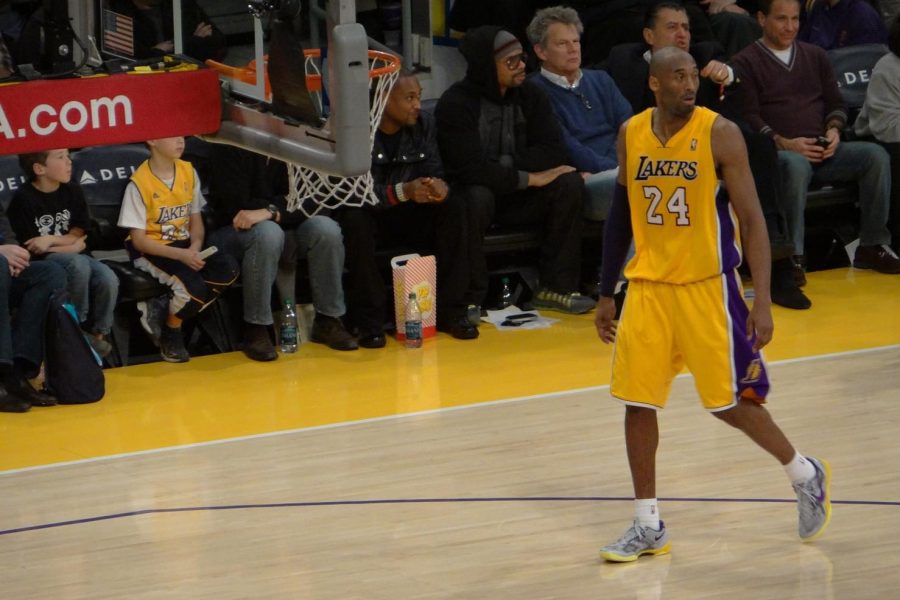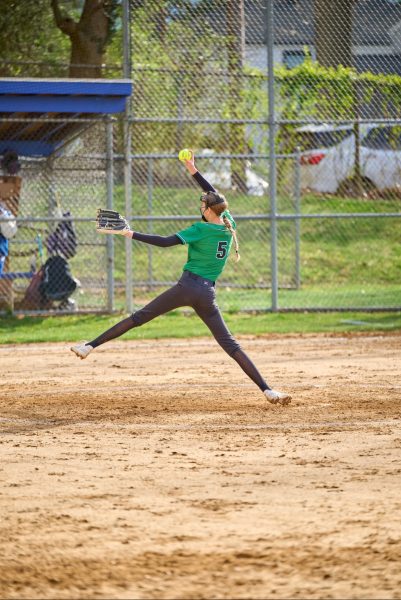Kobe Bryant’s death brought out the worst in national media
NBA legend among nine killed in Sunday helicopter crash
Wikimedia Commons/Fido - Flickr: Bucks @ Lakers
Kobe Bryant approaches the Lakers’ bench in a 2013 home game against the Bucks. Bryant died Sunday in a helicopter crash at age 41.
It’s just one of those things that stops time.
Shock, sadness, denial. All at once.
Kobe Bryant can’t just die…
There’s no way.
The day before, he was congratulating LeBron James for passing him in career points. And now, he, his 13-year-old daughter Gianna, and seven others are gone after a helicopter crash in Calabasas, California.
Continuing to move the game forward @KingJames. Much respect my brother ?? #33644
— Kobe Bryant (@kobebryant) January 26, 2020
But amidst the devastating online reactions — the posting, the texting, the endless Twitter feed refreshing in hopes that this was all just one big mistake — another unfortunate reality of today’s world came to light.
Modern media is so engagement-driven, so obsessed with those extra clicks, so zeroed in on making sure their tweet is the one that goes viral, that many of the news outlets we, as a society, are supposed to deposit our trust into are more concerned about reporting the story first, than getting the story right.
This was evident in a multitude of stories as time crawled by. First, it was reported that five people were killed in the crash; it was later revealed to be nine. But at the end of the day, a numerical misevaluation can be forgiven — there can be a logical explanation for that. What’s inexcusable is reporting the death or involvement of specific people without confirmation — as was the case when it was falsely reported that Bryant’s former teammate and current actor Rick Fox was involved in the crash.
Fox — a 3-time NBA champion as a teammate of Bryant — and his family were already receiving commiserations throughout social media before his stepdaughter, Jillian Hervey, cleared everything up.
To confirm my stepdad Rick Fox is ALIVE and safe! I just got off the phone with my sister. We are all in shock and deeply saddened but please don’t spread false news. #ripkobe ? pic.twitter.com/vGSAShagkk
— LION BABE (@LionBabe) January 26, 2020
Not long after, in an update during ESPN’s coverage of the NFL Pro Bowl, ABC news anchor Matt Gutman carelessly mentioned that all four of Bryant’s daughters were aboard the helicopter. It wasn’t done in “breaking news fashion.” Instead, it was casually slipped into the end of his segment, and could easily have been missed by someone not paying full attention. But he reported it as fact, and its effects were real. The social media world did not miss a beat before mourning the loss of the four young girls.
Today I inaccurately reported it was believed that four of Kobe Bryant’s children were on board that flight. That is incorrect. I apologize to Kobe’s family, friends and our viewers. pic.twitter.com/yYwuB9vpZl
— Matt Gutman (@mattgutmanABC) January 27, 2020
Yet it didn’t end there. Because it would have been too hard for media outlets to simply be honest about how they lacked information on the state of Bryant’s family. Because the clicks are the top priority and nothing else comes first.
FOX reporter Alexis Wainwright later tweeted that none of Bryant’s kids were aboard the helicopter, giving the world a moment of relief in a time of distress. But once again, careless reporting and rushed informing contributed to another indefensible error.

By the time TMZ accurately reported the death of Gianna “GiGi” Bryant, 70 minutes had passed since the original tweet that triggered the chaos. Within that time frame, supposedly-reliable news outlets inaccurately reported four deaths, one survival, the crash’s death count and the cancellation of the entire slate of Sunday’s NBA games.
It was a somber day to be a sports fan, inexplicably made worse by the greed of national media in its pursuit of clicks and engagement. One can only hope that media outlets and members will learn from Sunday’s events and be more careful in the future. However, in a time when it brings in more revenue to be first than it does to be right, it would be misguided to let that hope become an expectation.
BELOVED IN OC: Longtime @orangecoast baseball coach John Altobelli, his wife and daughter, and @HarborDay coach Christina Mauser were among the 9 killed when Kobe Bryant's helicopter went down in Calabasas. https://t.co/DvGoprCWEw pic.twitter.com/qnozONuhvz
— CBS Los Angeles (@CBSLA) January 27, 2020


















Tosh Kazer • Jan 30, 2020 at 5:52 pm
Agree 100%! My wife was one of the first female photo journalists for numerous news papers/sources. She and I are discusted with the state of reporting today.
Thanks for your confirmation!
Bill Reger • Jan 28, 2020 at 8:17 pm
Fantastic work Spencer.
Paul Zeller • Jan 28, 2020 at 2:56 pm
Brave journalism Spencer. Students and aspiring journalists your age should be able to look up to the media giants as the “gold standard,” but instead, you are forced to call them out. Journalism is not broadcasting “what we are hearing,” but reporting verified facts. Show them how it’s done!
Mr. Sherman • Jan 28, 2020 at 1:57 pm
One of the best articles ever written. Bravo.
Laraine Kensicki • Jan 28, 2020 at 12:04 pm
Your article is right on point, Spencer. When public receives news updates on any given event, we should be able to trust the media. Sadly, you’re right, that getting the scoop seems to outweigh getting the facts.
Caroline McDermott • Jan 28, 2020 at 8:56 am
Great job Spencer… this is so well written and makes a point on media culture that I think can get swept under the rug in our society.
John Rondi • Jan 28, 2020 at 7:36 am
Well said, easy read and POINT ON!
Social media floods our heads with too much white noise. We read too much into text already.. the carelessness of data only brings unnecessary casualties to sensitive issues.
Nice work Spence!
Sarajian • Jan 27, 2020 at 10:54 pm
Nice job Spencer.